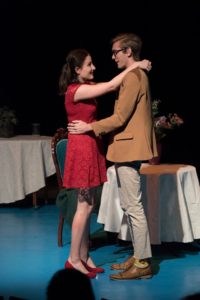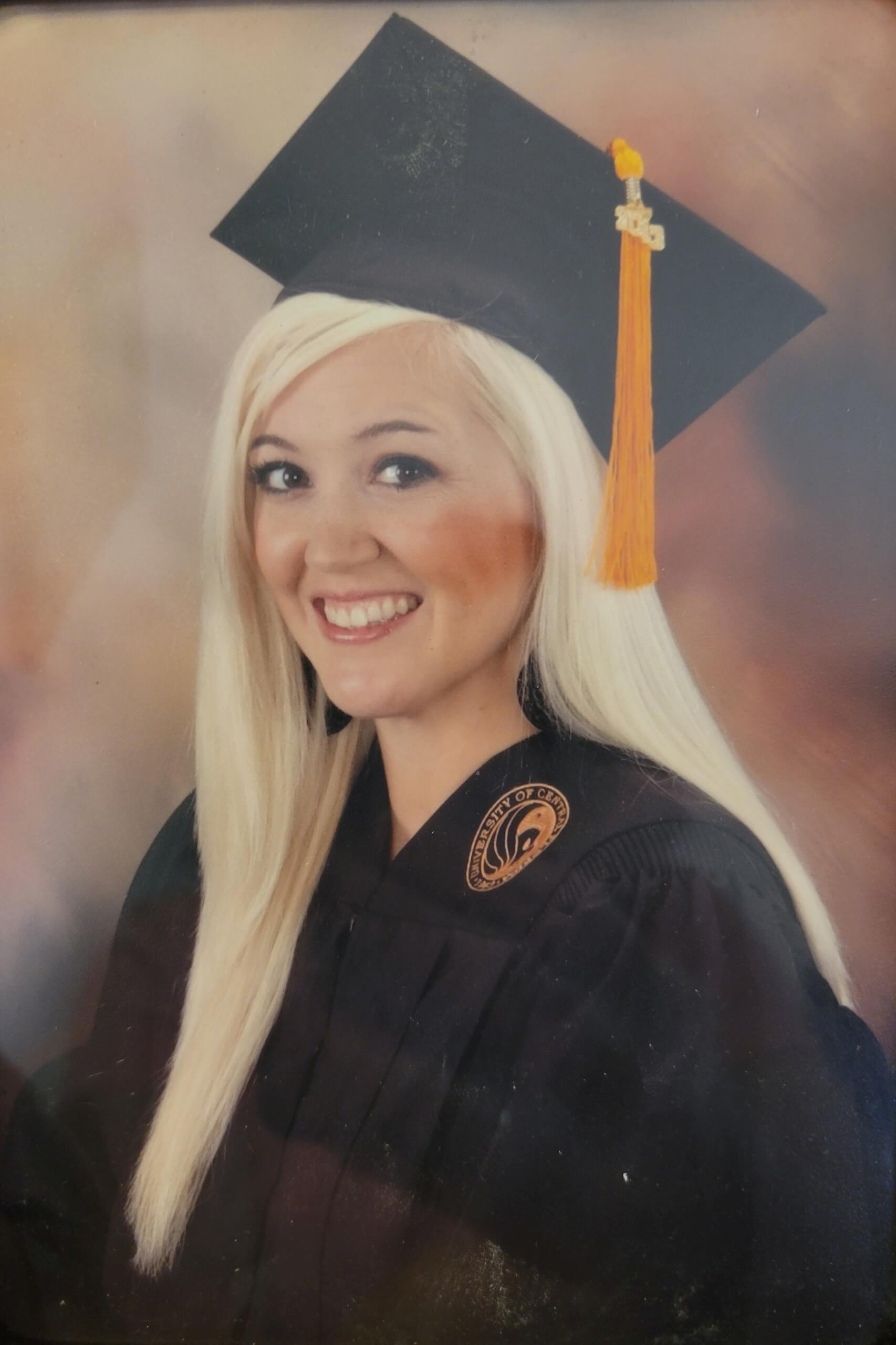Alumna’s “First Miss” Takes Center Stage at UCF Celebrates the Arts
When alumna Sarah Schreck ’18 talks about theatre, she can somehow, within seconds, bounce from talking about its power to create social change to emphatically saying “I will watch ‘Xanadu’ every month until the day I die.” She’s seen the ways theatre can be simply enjoyed, she’s seen the ways it can grow people, and this weekend at UCF Celebrates the Arts, she’ll get to see her own play, “First Miss”, come to life.
Sarah, who is currently attending Carnegie Mellon University for her graduate degree in arts management, was born and raised in Orlando. When she was 10 her family relocated to Jacksonville, but when it was time to pick the location of her undergraduate career, she had a feeling she should return to the place where she felt most at home. That was Orlando, and it became UCF.
“I don’t even think it’s nostalgia goggles,” Sarah says. “UCF is where I became who I am. I honestly did not expect to have such a formidable college experience, but the best times of my life were the relationships that I formed in the performing arts center — auditions with friends where we’d leave laughing and those emotional days where we’d be moved to tears because of one another’s dedication and hard work. That place feels like home.”
One of the most impactful experiences Sarah had during her time at UCF was a class that ultimately led to her involvement in this year’s Celebrate the Arts. She describes the class, theatre for social change, as providing her with more confidence, courage and artistic ability to communicate.
In the class, which is taught by Sybil St. Claire, students learn new techniques of storytelling and how these nontraditional forms of theatre can be influential for audience members and performers alike. Of the many techniques, playback theatre is the one Sarah most took to and is what sparked an idea that became “First Miss”. In this form of theatre, there is a group of performers, an emcee and an audience. Led by the emcee, the audience shares feelings and stories from their own lives while the performers play them back to them.
“The stories can be anything,” Sarah says. “From a lighthearted story about a day at Disney gone awry to discovering one’s faith and addressing it with your parents while they’re on their deathbed. Either way, at the core of it all is that there is medicine in our stories. Seeing things from your life played back to you, it’s kind of like drama therapy, which I am a big advocate for.”
One day in class Sarah wanted to share one of her favorite stories to tell as a playback exercise, the story of her junior prom. Like most humans who went to prom, Sarah’s prom story is more likely to elicit a quick cringe and an “oof, that’s rough” than it is a John-Williams-scored-movie-moment. It’s the story of two teenagers, not sure if they like each other, little bit of miscommunication, touch of butterflies, and a slow song on the dancefloor.
“We leaned in and — I don’t know — I guess we closed our eyes too soon because we did not make it to each other’s lips,” Sarah says. “It wasn’t his first kiss, but it would’ve been mine. Except it wasn’t my first kiss, it was my first miss.”
When Sarah got involved with Project Spotlight, a student-run organization that gives UCF students a chance to take part in productions and develop new works, she knew she needed a good story she could turn into a one-act. She remembered that not only was her junior-prom story relatable for her, but fellow classmates were able to identify with much of the underlying themes.

As she started developing the story into an actual written play, she noticed it started changing and taking on new shape. Through her writing, the story deepened and started to take on more serious issues about adolescence. In the fall of 2017, “First Miss” had its first production and was so much of a hit that the team of folks who put together UCF Celebrates the Arts thought of it as a potential event in the 2019 lineup. Sarah was sitting on her couch in Pittsburgh one day when the previous artistic director for Project Spotlight, Liz Calvert, called to ask her if she’d be interested in being a part of UCF Celebrates the Arts. One caveat, she’d need to expand the script from one-act to full-length play.
“My first thought was ‘I only lived so much, I don’t know what else to put in!’ Sarah says. “But, that wasn’t true, there were already fictionalized elements, even if it started as a personal story. So if I was going to get to add another act, I wanted to really dive into more issues in a way that gives artists — especially student artists — permission to embrace not only the quirky humor in a piece, but to also tackle difficult subjects in decidedly unusual ways.”
During her next round of writing “First Miss”, Sarah took seriously her chance to get input from different people with different backgrounds and walks of life. She asked people for their stories of adolescence, miscommunication, gender and relationships. She sought out her opportunity to tell a story that would, using elements of other’s real stories, address a wider audience.
“I think a lot of theatre deserves to be a living, breathing document,” Sarah says. “I think that’s how it may retain a kind of community-based magic. Theatre from any era can be healing to watch, you can recognize lessons and recognize characters. But to recognize yourself is all the more valuable. That’s something I hope that all of my work can do. I would hate to have something so boxed in that it only serves one group of people.”
For Sarah, being a playwright is a chance to figuratively be several different people. It’s evident in her work that she appreciates and places great value in being able to embrace disagreement and accept a level of pluralism that acknowledges nuanced and ever-evolving thought and feelings. With playwriting, she can explore her own internal conflicts by giving voice to multiple sides of arguments or stories.
She also, as someone who grew up letting her imagination run rampant, enjoys the chance to see her imaginary friends — more appropriately called characters in the theatre world — become real.
“I just hope that I gave the actors and the crew enough to have fun with,” Schreck says. “Because every play belongs to its cast, crew and audience. It doesn’t even belong to me anymore. None of it does. And I wouldn’t have it any other way.”
Purchase your tickets for Saturday’s performance of “First Miss” and learn more about UCF Celebrates the Arts.
Item


